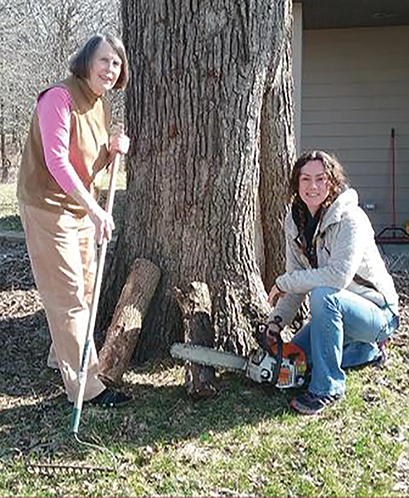Sustaining ecological abundance
Fresh ecospirituality for thought at Prairiewoods
“Prairiewoods was founded with the belief,” begins Nancy Hoffman, FSPA, “that integral ecology and connection with the earth are spiritual necessities.”
spiritual necessities.”
And they continue to be the sustaining seeds of ecospirituality at the FSPA-sponsored Prairiewoods Franciscan Spirituality Center in Hiawatha, Iowa, that Sister Nancy has sown herself: first as one of its founding members, and now as coordinator of outdoor land care. Together with Prairiewoods’ Ecospirituality Coordinator Emelia Sautter, Sister Nancy is planting renewed spirituality and ecology with the Backyard Abundance Design Project.
Backyard Abundance is an organization “that teaches ecological skills to enable the creation of beautiful, resilient communities and landscapes that model healthy ecosystems,” Sister Nancy and Emy explain. “Through research, education, demonstration and collaboration,” the nonprofit helps to “cultivate regenerative landscapes that grow food, improve water and soil quality, and provide habitat.” The project serves (literally and figuratively) as food for thought, says Sister Nancy, “in blending the tenets of permaculture design with the cosmic, spiritual principles of interiority, diversity and communion through land care design and practices.”
These fresh elements will build upon and strengthen the spiritual and physical care for community and creation Prairiewoods has always imparted. To enrich the existing landscape that currently features prairie and forest, an orchard and trail system, vegetable and healing gardens, The Garden of Eat’n Project (as they call it) will grow:
Education. “Prairiewoods will be a living classroom, helping staff and visitors understand how humans can live in harmony with nature to create landscapes that help meet learning, nutritional and spiritual needs while improving environmental and social health.” A student intern from a local college is also involved with implementation and education.
Food. “The landscape will yield a variety of desired fruits, vegetables and herbs. Harvesting ease will be considered and incorporated.” Visitors can graze on currants or bush cherries; enjoy oregano. To make edibles more attractive and educational and require less maintenance, visitors and volunteers will be invited to participate in land care and harvest activities.
Function and beauty. “The space will feel like a cohesive and flowing whole, engaging all senses and inviting visitors to play, harvest and linger.”
Habitat emulation. “The landscape will emulate the patterns, processes, principles and properties of one or more healthy habitats like forests, woodlands, thickets, prairie and meadows.”
Environmental benefits and lower maintenance. “The use of existing onsite resources and energy (recreation, food harvesting, leaf litter, rain water, sunlight, wind, animals and insects) will be maximized to reroute energy and waste products, enabling the landscape to better care for itself rather than requiring constant oversight. Mulching, erosion control and fertilizing will be lessened through the use of durable, strategically-placed plants. The role of existing vegetation will be assessed to understand how it contributes to decreasing maintenance.”
Self-empowerment. “Staff will gain the knowledge and experience from the project to design and establish future gardens more independently.”
And with such verdant, vibrant ecology and spirituality Backyard Abundance is flourishing from the project too. “A permaculture landscape is a natural fit for the center’s goals and values, and the staff has been truly amazing—among the most like-minded organizations we’ve had the pleasure to work with,” says Jen Kardos, one of the organization’s directors. “We have grown in our own spiritual path.”
Prairiewoods is offering a variety of educational and hands-on learning classes in its “Joyful Gardening” project series.


